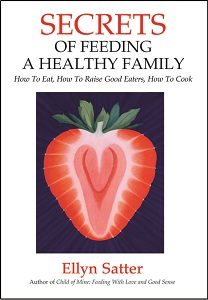

Family Meals Focus
The Ellyn Satter Institute Newsletter
A Taste of Eating Competence for Clients Struggling with Eating
By Keira Oseroff, MSW, LCSW, CEDS and Jennifer Harris, RDN, LD, CEDRD-S
For a PDF of this newsletter, click here
Keira Oseroff and Jennifer Harris are Ellyn Satter Institute (ESI) faculty members who are expert in the treatment of eating disorders. Both base their work on the “How to Eat” method from Ellyn Satter’s Treating the Dieting Casualty workshop, and they collaborate in leading the twice-yearly online workshop.
An all-too-typical first meeting with a client struggling with their relationship with food goes something like this: “I have food issues and I’m hoping you can help me. I have been trying to lose weight on and off for as long as I can remember, and I can’t seem to get anywhere anymore. In the past I could lose weight and maintain it for a while, but now I cannot put together one day of good eating. I say to myself, ‘I’ll do better tomorrow.’ But tomorrow never comes.”
Clients present typical patterns
Clients are desperate for change, but having no idea what change looks like, they return to the familiar, destructive cycle of yo-yo dieting. They are obligatory dieters—a person who can no longer diet but who no longer knows how to eat. Sadly, folks striving for weight loss have been joined by way too many others who are so locked in conflict about what and how much to eat that they feel undeserving of eating pleasure and experience eating as unrelenting misery and shame. At the same time as they continually admonish themselves, “I shouldn’t eat this . . . I ate too much of that . . . I don’t dare have that around,” today’s obligatory dieters aren’t even aware that they have been enslaved by food restriction. Their often vague but cruel self-expectations about eating leave them so insensitive to and mistrustful of their wants and needs with food and eating that they can only respond to extremes of hunger, food craving, and fullness. While they may not be eating disordered, their struggle with eating plays a central role in life and is no less devastating. They are demoralized and incapacitated.
When we focus on how we feed ourselves, the what follows naturally within the trust-based Eating Competence model.
Define problems so they can be solved
Ask, don’t tell. How does your client go about feeding themselves? What would they like to be different about their eating? Do they want to resolve their conflict and anxiety around food and eating? Are they willing to develop trust in taking care of themselves with food? Can they take the risk of honoring their natural and life-giving need to get enough to eat of food they enjoy? Can they put their weight concerns in a box and shelve them—at least for now? Taking the Eating Competence approach lets them achieve their goals, but in a completely different way. Even though ecSatter doesn’t say a word about weight and/or eating the right food and avoiding the wrong food, Eating Competence is positively correlated with better nutrition,1, 2 lower BMIs,3-5 superior metabolic profiles,3, 6, 7 and more-positive quality of life indicators.8-10 Eating competence is measured by the validated ecSI 2.0.8, 11
ecSatter is the antithesis of today’s eating attitudes and behaviors
The trust-based ecSatter comprises four factors.12
- Positive attitudes and beliefs about food and about eating. Competent eaters are relaxed about food and eating. They enjoy eating and are comfortable with their enjoyment. They don’t obsess after they have eaten, nor are they guilt ridden. They eat and they move on.
- Food acceptance skills. Competent eaters are interested in food and enjoy trying new foods. They can “make do” in situations that call for it, eating food they don’t much care for because not every meal has to be the most exciting.
- Internal regulation skills. Competent eaters are internally regulated. They tune in to their bodies when they eat. Within the context of structured meals and snacks, they trust their hunger and fullness cues to guide how much to eat.
- Context management skills. Competent eaters plan for feeding themselves. They are reliable and can depend on themselves to have enjoyable and regular meals and snacks in between if they want/need them.
Developing Eating Competence sets aside the trouble and struggle
ecSatter lets obligatory dieters believe in themselves. Arriving at Eating Competence is a personal journey offering nutritional, emotional, and physical wellness. Some become positive and self-trusting with eating without much difficulty and can even use self-help publications.13, 14 Others find it to be more challenging and that they need support from a Ellyn Satter Institute-trained professional who systematically guides them in How to Eat.15 As described by The Satter Hierarchy of Food Needs,16 becoming trusting with the how of eating allows the what to follow. As with Maslow’s Hierarchy of Needs, one naturally learns and grows with Eating Competence as food needs are dependably satisfied, beginning with getting enough to eat at predictable times, then having longer-term food security, then moving into increased dietary variety supporting nutritional excellence.
References
- Lohse B, Faulring K, Mitchell DC, et al. A definition of “regular meals” driven by dietary quality supports a pragmatic schedule. Nutrients. 2020;12. doi:10.3390/nu12092667
- Lohse B, Bailey RL, Krall JS, et al. Diet quality is related to eating competence in cross-sectional sample of low-income females surveyed in Pennsylvania. Appetite. 2012;58:645-650.
- Tilles-Tirkkonen T, Aittola K, Männikkö R, et al. Eating Competence Is associated with lower prevalence of obesity and better insulin sensitivity in Finnish adults with increased risk for type 2 diabetes: The StopDia Study. Nutrients. 2019;12. doi:10.3390/nu12010104 PMC7019577,
- Tilles-Tirkkonen T, Nuutinen O, Suominen S, et al. Preliminary Finnish measures of eating competence suggest association with health-promoting eating patterns and related psychobehavioral factors in 10–17 year old adolescents. Nutrients. 2015;7:3828-3846.
- Quick V, Shoff S, Lohse B, et al. Relationships of eating competence, sleep behaviors and quality, and overweight status among college students. Eat Behav. 2015;19:15-19.
- Lohse B, Psota T, Estruch R, et al. Eating competence of elderly Spanish adults is associated with a healthy diet and a favorable cardiovascular disease risk profile. J Nutr. 2010;140:1322-1327.
- Psota TL, Lohse B, West SG. Associations between eating competence and cardiovascular disease biomarkers. J Nutr Educ Behav. 2007;39:S171-S178.
- Krall JS, Lohse B. Validation of a measure of the Satter eating competence model with low-income females. Int J Behav Nutr Phys Act. 2011;8:26-36.
- Lohse B, Satter E, Horacek T, et al. Measuring eating competence: psychometric properties and validity of the ecSatter Inventory. J Nutr Educ Behav. 2007;39:S154-S166.
- Lohse B, Mitchell DC. Valid and reliable measure of adherence to Satter Division of Responsibility in Feeding. J Nutr Educ Behav. 2021:211-222.
- Lohse B. The Satter Eating Competence Inventory for Low-income persons is a valid measure of Eating Competence for persons of higher socioeconomic position. Appetite. 2015;87:223-228.
- Satter E. Eating Competence: definition and evidence for the Satter Eating Competence Model. J Nutr Educ Behav. 2007;39:S142-S153.
- Satter E. Secrets of Feeding a Healthy Family: How to eat, how to raise good eaters, how to cook. Kelcy Press; 2008.
- Satter E. Feeding Yourself with Love and Good Sense. Kelcy Press; 2020. https://www.ellynsatterinstitute.org/product/feeding-yourself-with-love-and-good-sense-grouped/
- Satter EM. Treating the Dieting Casualty: Intensive Workshop on Treating the Chronic Dieter. Ellyn Satter Institute. Accessed April 27, 2021, https://www.ellynsatterinstitute.org/education/workshops-keynotes/treating-the-dieting-casualty-vision-workshop/
- Satter E. Hierarchy of food needs. J Nutr Educ Behav. 2007;39 (5 suppl):S187-188.
Explore

Keira Oseroff, MSW, LCSW

Jennifer Harris, RDN, LD, CEDRD
To read about applying sDOR-consistent nutrition education with children, read Appendix H, “Nutrition education in the schools,” in Ellyn Satter’s Secrets of Feeding a Healthy Family.

More about eating competence
- Eating competence
- Eating competence: Context-management skills
- ecSI 2.0
- Evidence for ecSatter
- How to eat
- The joy of eating: Being a competent eater
